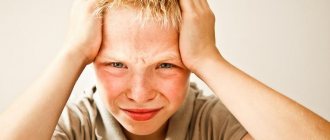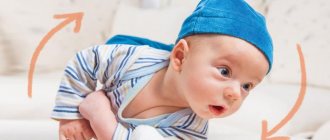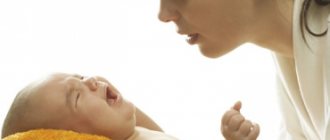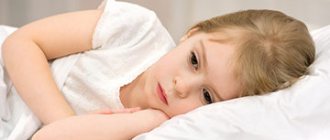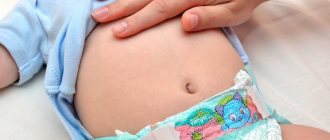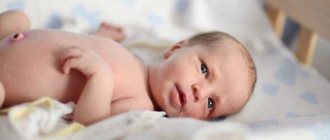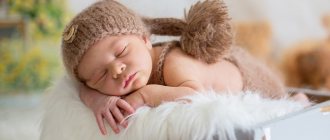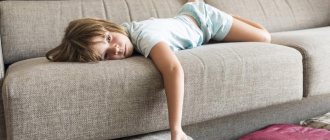Even over-caring parents who devote 24 hours a day to caring for their beloved baby cannot protect their child from falls. In just a split second, something that scares young mothers almost to the point of trembling can happen - the first fall of a newborn. From the first months of life, he actively explores the surrounding space, explores the capabilities of his own body with curiosity, actively rolls over, crawls, and then runs. Naturally, this process does not happen without “accidents”: a small child can fall out of bed, fall out of a stroller, crash his forehead into a door frame or hit his head on the corner of a closet... But who knows how many misfortunes await a young naturalist? Moreover, the seriousness of the consequences of a fall depends not only on the force of the impact, but also on the correct behavior of the mother. What to do if a child falls? How to assess the degree of danger of what happened and whether it is worth rushing to the doctor immediately? Find answers to your most pressing questions in our article.
Why do newborns fall more often on their heads?
When falling from a height (even from 40-50 cm, which is greater than the height of a month-old baby), children, as a rule, hit their heads and receive various traumatic brain injuries. The reason lies in the anatomy of newborns. Their head is much heavier than the weight of the rest of the body, so when tilted it outweighs and takes the brunt of the blow.
Additional Information. The baby’s skull is characterized by bone sutures that have not yet fused and open fontanelles (the main ones are on the crown and the lesser occipital), which helps soften blows and slightly protect the brain, but you should not rely entirely on this natural protection.
Closer to the age of one year, babies begin to move actively, their body proportions change compared to the neonatal period, so various injuries to the extremities are added to cranial injuries from falls.
Reviews
Svetlana, 26 years old, Sevastopol
I am the mother of 2-year-old Seryozha. I love my son very much and, like all caring parents, I try to be nearby all the time. However, one situation taught me that you can’t trust your baby to anyone. Here is how it was! A friend came to visit me, and at that time I was playing with my son on the bed. I went to the kitchen to make coffee, left the child with a friend, but she didn’t follow, the son jumped on the bed and fell head down on the floor. I experienced fear then - it’s even difficult to explain. After he fell, he did not lose consciousness, he cried a little, but he became very pale, he broke his nose, and for several minutes his movements became sluggish. I was very scared and immediately called an ambulance. Fortunately, the doctors arrived very quickly, examined the child, and told him to go to the hospital. When we arrived at the hospital, my little son did not cry, played, did not complain of pain, and was generally cheerful and cheerful. The doctor on duty examined him, performed an MRI, and imagine my surprise when we were diagnosed with a “crack in the left temporal bone.” The doctor reassured me and said that there was nothing to worry about, and that the crack itself was very small and would heal very quickly. We were left in the hospital for 4 days. After being discharged home, I was advised to keep complete rest and monitor the child more closely. I am very ashamed that I could not avoid my son’s fall. We are now 6 years old, there are no consequences of the fall, although I am very worried, periodically I consult a doctor who assures me that my son is completely healthy! I advise mothers not to leave their children unattended, because one rash act can cost your child’s health. I am happy that in our situation there were no consequences!
Kristina, 33 years old, Moscow
When my daughter turned 1 year old, my husband and I bought her a very beautiful children's bed, which we soon regretted very much. On the very first night, her daughter fell off her in her sleep. Fortunately, there is a thick carpet under the bed and the impact was not strong. After the fall, the daughter apparently did not understand what had happened, because she was sleeping, but immediately burst into tears. My husband and I didn’t sleep a wink until the morning, cursing both ourselves and the bed. In the morning I noticed a small abrasion near the ear, there were no more complaints. They didn’t go to the doctor, but the husband screwed the side rail to the bed that same day so as not to risk the baby’s health anymore. Now my baby is 3 years old, there are no consequences of the fall, but the side of the bed remains there to this day. I would like to give advice to parents: think about the safety of your child in advance!
Veronica, 22 years old, Kyiv
My son is 7 months old, about a week ago, due to my carelessness, he fell out of bed, straight upside down. He cried a lot, but not for long, then he started playing again. There don’t seem to be any changes, but I’ve read on the Internet about the possible consequences, so I’ll definitely go to the doctor tomorrow, let him examine and calm my mother’s heart! I hope everything is ok, but I really blame myself for not seeing it!
Olga, 25 years old, Moscow
My daughter is only 9 months old, but she is so active that it is almost impossible to keep track of her. She keeps falling! Recently I managed to crawl out of bed and fall onto the floor. I still can’t understand how she managed it! After she fell and cut her eyebrow, we cried together, but gathered ourselves together, treated the wound with peroxide and ran to the doctor, it’s good that the children’s hospital is across the road. The doctor examined the baby, sewed up her eyebrow, and said that she had a slight concussion - her eyes were very darting and she vomited once. They prescribed us bed rest and complete rest. Almost 6 months have passed since then, everything seems to have worked out, but today I cannot forget this fall, I am very worried that there will be no consequences in the future. I recently watched Komarosky’s program, where he answered questions from parents about child falls. So he assures that in most cases there is no need to worry, but a consultation with a doctor after the “flight” from the child’s sofa is necessary in any case.
Consequences after a fall
What to do if your newborn baby hits his head
Traumatologists, including children , distinguish 2 main types of skull injuries:
- Open - with significant damage to brain tissue and bone areas (fortunately, if a baby falls from a changing table or sofa, they happen quite rarely);
- Closed - sometimes they do not appear outwardly at all, because the main damage occurs to the baby’s brain: a concussion (with fainting, confusion, vomiting, sweating), a bruise (prolonged loss of consciousness and a general pathological condition of the victim are possible) or compression (signs vary in size, atypically large pupils, convulsions, loss of reflexes, especially the knee).
The child hit his forehead
The bones of the frontal parts of the skull are quite hard, so if the baby hits his forehead when landing on the floor (or better yet, on the carpet), serious consequences are unlikely to occur. However, in this area there are a large number of small capillaries, which, bursting upon impact, form large and convex lumps and hematomas.
When a child hits the floor, a lump forms on his forehead
The child hit the back of his head
A blow to the back of the baby's head may not be very dangerous if the child fell from a low sofa or bed, but more serious if he fell from a changing chest or high chair. In any case, such falls are fraught with future vision problems, since most of the visual nerve endings are located in the occipital regions of the brain, so such a “pilot” will definitely need to be checked by a pediatric ophthalmologist. The baby may also experience muscle weakness, trembling of arms and legs, or even loss of consciousness, as well as lumps and subcutaneous hematomas at the site of impact.
The child injured his limbs
The consequences of falling from a sofa can be bone injuries. Most often - dislocations and fractures, since the children's skeleton is not yet strong enough and is not fully formed.
Sometimes children get broken limbs when they fall.
Signs that a child has a broken arm or leg will be sharp pain when trying to move or put pressure on the damaged limb; slight growing swelling; loss of sensation (if a nerve is affected). When a dislocation occurs, the affected joint does not look quite typical; it seems to be out of place. You can understand that your baby has a dislocation by observing him and seeing that he has difficulty leaning on his arms, cannot stand up, or it is painful for him to change clothes.
The child has injured his neck or back
The most serious consequences for a baby's health come from falling on the back or neck, since these places contain the spinal cord, which is the main part of the human nervous system and is responsible for all motor functions. With neck injuries, the consequences can be either minor (sprained ligaments) or fatal, including disability.
If a baby falls unsuccessfully from a sofa or higher point onto a hard floor surface, his vertebrae may become displaced, which causes headaches, drowsiness, lethargy and pain in the cervical spine.
Important! In case of such injuries, you should not touch the child, so as not to worsen the consequences, you should immediately call doctors.
Back injury: is it possible?
Many mothers are interested in the question of what the consequences may be if the child falls on his back. The main danger of a back injury is the high likelihood of brain damage.
The symptoms that indicate a back injury are identical to those mentioned earlier (section on neck injury).
Detection of even one symptom requires urgent medical attention. The main thing is to provide the baby with complete immobility and peace.
When to sound the alarm after a fall
What to do if a child chokes on saliva in his sleep
When an infant falls from a sofa or bed, it is always scary for parents. In this situation, you need to pull yourself together and determine whether there are alarming symptoms that require an immediate call to the ambulance team, since the injury is very serious. Among them:
- different pupil sizes, they are greatly constricted or dilated;
- pulse rate – less than 110 or 120 beats per minute (for babies from six months to a year);
- the child shows no signs of life, lies motionless (fainting or loss of consciousness);
- the eyelids tremble, convulsions run through the body;
- in babies six months of age and older, coordination of movements is impaired (arms and legs do not obey him);
- severe weakness (for example, the child cannot even clench a fist), lethargy of the limbs, weakened reflexes;
- profuse vomiting;
- pallor on the face, dark “bags” under the eyes and spots behind the ears;
- prolonged intense crying that lasts more than five minutes (any baby will cry from fear, but he can be calmed down);
- nosebleeds, as well as discharge from the ears - leakage of colorless cerebrospinal fluid.
If there are alarming symptoms, you should urgently call an ambulance for your child.
Even seemingly small injuries (especially to the head) can turn out to be very serious, so you should react quickly and contact doctors, describing the incident in detail to them for a more accurate diagnosis and prescribing adequate treatment. The sooner the baby gets into the hands of doctors, the less consequences a fall from a bed or sofa will have.
What you need to know about further treatment
If nothing bad happened, then most likely you will be allowed to go home. However, in the following days you should behave cautiously and carefully monitor the offspring - doctors sometimes do not notice problems.
The first week after the fall should be as calm as possible. The child should be kept from active games - both at home and in the yard. Bed rest for a week should help heal even injuries that go unnoticed by a doctor.
When there is concern that a child has suffered a concussion or skull injury, it is better to undergo an ultrasound or CT scan. Confirmation of the diagnosis requires complex emergency treatment. In this situation, the doctor prescribes certain medications and sometimes physical education and physiotherapy. By taking timely measures, it is almost always possible to avoid future problems. Only in isolated cases does a concussion at such a young age lead to serious complications.
First aid for a child after a fall
A newborn baby laughs in his sleep - reasons and what parents should do
The severity of the consequences of a baby’s fall can be reduced if you provide him with proper first aid before the ambulance or local pediatrician arrives, when the mother will do everything clearly and promptly.
First of all, you need to pull yourself together and calm the child down: try to explain to him in a confident voice what happened and that everything will be fine, you can comment out loud on your actions - this will distract the little sufferer from the pain.
The first thing you need to do is calm down your fallen baby.
If a child has a cut in the soft tissues of the head, the bleeding wound should be thoroughly washed and treated with at least hydrogen peroxide. You should listen carefully to the baby’s crying: when he immediately screamed and burst into tears, it was most likely from fear; the fall was not serious.
After the child has calmed down and the bleeding from the wound has stopped, he must be very carefully laid on a flat horizontal surface and carefully examined for bumps, scratches and bruises. A cold object should be immediately applied to bruises and bumps to relieve swelling (a hot water bottle with ice is ideal). If the baby is unconscious (not moving, eyes closed or rolled up), you need to pat him on the face and blow on him.
Note! To bring the baby to his senses, you can bring cotton wool with a drop of ammonia under the nose.
If a limb is injured, you should not move it to avoid displacement of the broken bones; it is important to immobilize the damaged leg or arm of the baby and rush to the emergency room, because dislocations do not correct themselves and the bones do not heal. To relieve swelling, you can gently apply a cold compress. There are small nuances in providing assistance depending on the age of the affected baby.
At 3-6 months
Thus, three-month-old and up to six-month-old infants can fall from a sofa or low bed if they have already learned to roll over onto their stomach or simply actively move their legs and arms. Their fontanel is still soft, the bones of the skull can converge, which to some extent reduces the severity of the consequences of a fall. If the baby has not lost consciousness and does not have serious visible injuries, a good option as first aid and to calm him down is to give him breastfeeding or plain water, rock him, and sing a song. It is not recommended to use active games even as a distraction - the baby must recover from the fall and the shock he experienced.
However, no matter how healthy the injured baby may look until he is six months old, he should definitely be shown to a pediatrician later to eliminate the delayed consequences of a fall.
At 7-9 months
If a child aged 6 months or older fell from the sofa and after the fall he was only frightened, and there are no more alarming symptoms (except for a small abrasion on the forehead), you do not need to call an ambulance. In the future, for such children, visual load should be reduced - no phones, tablets with cartoons or books.
How to deal with bruises?
The head is far from the only weak point of a child. Even if a baby falls on a soft carpet, he may develop painful abrasions and even bruises. Any damage to the skin should be washed with running cold water, treated with an antiseptic and, if necessary, protected with an adhesive plaster, bandage or bandage. Do not use alcohol solutions, including iodine, to treat the wound - they can only be used to lubricate the edges of the abrasion.
If you see a bruise forming at the site of the impact, immediately apply a cold compress to the damaged area. It is ideal if you have a heating pad with ice on hand. Otherwise, you can use whatever you have in the freezer. When choosing a cold source, be guided by the size of the bruise - do not use frozen chicken or a kilogram of ice cream for a pinpoint injury.
Important! If you use improvised products from the freezer as an ice compress, wrap them in a towel before applying them to the bruised area - the cold must be dry.
Experienced grandmothers, familiar with the effective secrets of traditional medicine, recommend lubricating the injured area with laundry soap as soon as the child falls - this will help avoid the appearance of a bruise or reduce its intensity to a minimum. Butter has the same properties. However, these methods can only be used if the integrity of the skin is not compromised.
Actions to Prevent Falls
Since it is almost impossible to stop a small “energizer” child in his quest to explore this world, it is up to parents to make his path as safe as possible. This also applies to the prevention of falls from sofas and other high surfaces. Pediatricians and experienced mothers strongly advise observing the following rules:
- Babies of any age (even those who do not know how to roll over onto their stomach) should not be left alone on the changing table for a second - they manage to fall off it;
- If you urgently need a distraction, it is better to place the baby in the bed, or, in extreme cases, on the floor;
- Children who already know how to stand on their feet require special control, especially to ensure that they do not hang out of the crib and fall headfirst onto the floor. It is advisable to install sides or limiters in the cradle, as well as lower the bottom of the bed as much as possible (if this is provided for by the design);
An older baby may fall out of the crib
- If a mother decides to put the child on her bed or sofa, she needs to make a side of pillows or a blanket (they will at least slightly delay the restless baby, and the parents will have time to react);
- For older toddlers who deftly spin in all directions, changing diapers should be done on a bed or low table;
- The most careful mothers generally place the most active babies on the floor (especially if it is heated) onto a comfortable mattress. There they sleep, play, change clothes and change diapers there.
Babies are very nimble and nimble creatures; even at a very tender age, they can unexpectedly fall from a sofa or other high surface and hit the floor. This usually results in traumatic brain injuries, dislocations and fractures. Such an incident is very frightening for both children and parents, so it is necessary to be able to provide first aid, be sure to show the victim to a doctor, and then try to prevent children from falling.
Some useful tips
- when the baby has learned to sit, be even more attentive to him - with increasing mobility, the likelihood of falling or falling out from somewhere increases;
- It is better to ride a child who has learned to sit in a low stroller, in which he can both sit and lie;
- you will not be able to protect your child from dangers and falls all his life, but in the first year of life he needs to be provided with maximum protection;
- throwing your baby up is highly not recommended; if you still practice such “games”, then forget that he can hit his head on the ceiling or chandelier;
- When rocking a child in your arms, move extremely carefully so as not to hit the child on the sharp edges of the furniture;
- Do not swaddle or change your baby on a table or bed without a guardrail. Remember that it only takes a second for him to be on the floor;
- prepare rompers, diapers, diapers and everything you need in advance;
- sleeping together with a child is dangerous because during sleep you do not control your movements, therefore, for safety reasons, the child should sleep in his own crib separately;
- no matter what happens, don't panic. In a state of panic, you can make an inappropriate decision and harm your child. Therefore, remain calm and, if something serious has really happened, consult a doctor.
Symptoms of serious injury to infants
The following symptoms indicate that the baby has suffered a dangerous injury:
- Loss of consciousness for a short or long time immediately after a fall or after some time.
- Formation of edema at the site of the impact, which rapidly increases.
- Presence of bloody discharge from the nose and ears.
- Abnormal behavior of the baby, which may indicate headaches.
- Vomit.
- Constant crying.
- Impaired coordination of movements.
A well-known doctor who described in detail the manifestations when a child fell and hit his head is Komarovsky. The dangerous consequences of such a blow if untimely medical intervention threatens the health of the baby.
